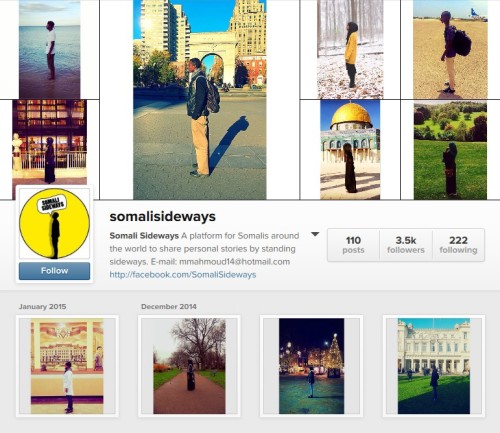Somalis (at home and abroad) take to social media to share successes, mobilize
Abdi Latif Dahir of Sahan Journal takes a unique perspective on how average people in Somalia (often Mogadishu) are engaging with technology.
Somali social media is alive and well. Gains in fibre connectivity, a burgeoning telecoms business environment, and improved personal security over the last three years have allowed millions to begin to share information online. And they’re using popular networks like Facebook and Twitter – and even Instagram.
There’s really nothing special about how Somalis are using social media. Some discuss serious political issues but many just talk about daily life in the country. Exciting, though, is that every success story – no matter how big or small – is being told. (Just look at the Somali Sideways project!)
As the article’s author puts it:
And those stories, whether positive or negative, whether political or cultural, are being told. As a result, every success story is celebrated through a Facebook post, every car explosion immediately posted on Twitter, and every new business enterprise boasted about on Instagram. Journalists use it to break stories; businesses employ it to promote their brands; humorists use it to share their 15-second jokes; and ordinary citizens use it to showcase the new face of their country.”
Online conversations are also fueled by many Somalis returning home from the diaspora who want to share unfiltered accounts of life inside Somalia. It’s no longer the Western press or aid groups that have complete control over what kind of information is seen abroad.
Twitter is a hotbed for important conversations and it comes as no surprise that hashtags are a rallying point. The diaspora is extremely influential on Twitter, perhaps more so than those actually inside Somalia. They used hashtags to collect aid for the 2011 famine. Presidential elections in 2012 began a series of hashtags that aim to hold the government accountable for their decisions. Separately, an online campaign successfully prevented large banks from cutting money transfer services is 2013-2014.
Abdirashid Hashi, the deputy director of the Heritage Institute for Policy Studies, commented on the blend of information that is being shared. He feels the connection among the diaspora and citizens living inside Somalia will keep growing as “socially conscious, media savvy and educated Somalis often join forces to push [for] issues of common interest.”
Ultimately, Somalis are taking pride in their ability to change the way in which the world sees the country.













 Twitter
Twitter Facebook
Facebook Pinterest
Pinterest